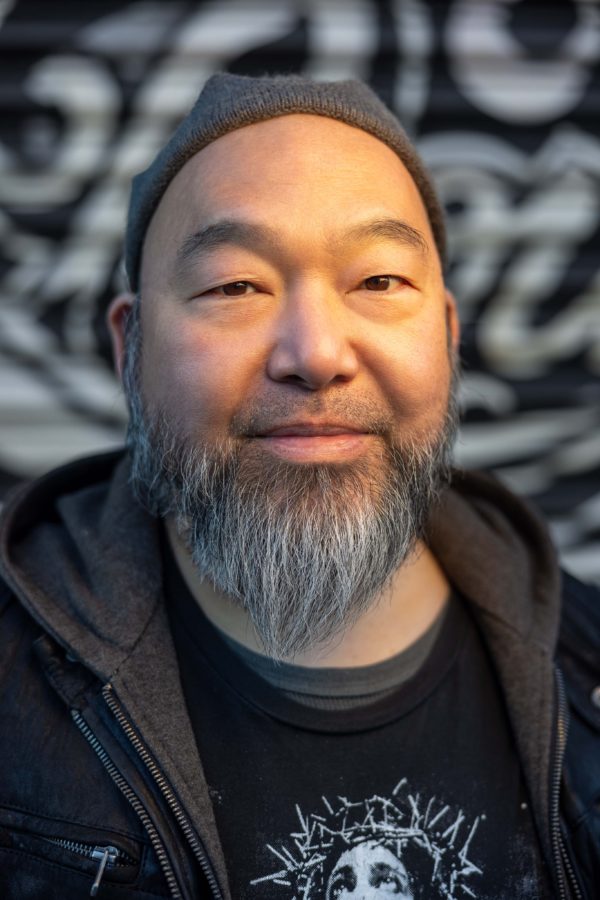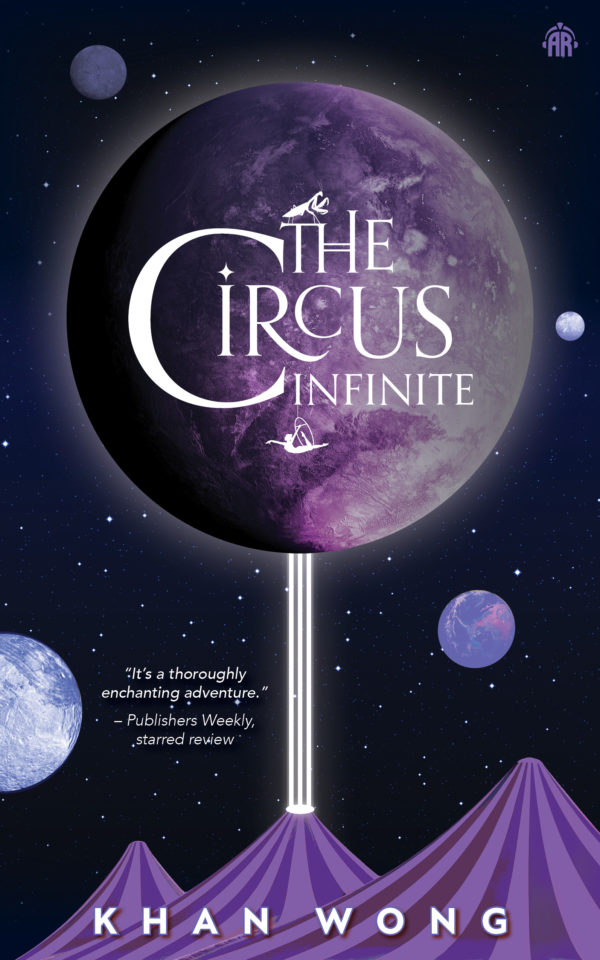
Welcome to my weekly Author Spotlight. I’ve asked a bunch of my author friends to answer a set of interview questions, and to share their latest work.
Today: In past chapters of life, Khan Wong has published poetry and played cello in an earnest folk-rock duo. As an internationally known hula hoop teacher and performer, he’s toured with a circus, taught workshops all over the world, and produced circus arts shows in San Francisco. He’s worked in the nonprofit arts for many years, most recently as an arts funder for a public sector grantmaking agency.
Thanks so much, Khan, for joining me!
J. Scott Coatsworth: What was your first published work? Tell me a little about it.
Khan Wong: It was a poem called “First Love.” It was about coming out, and about someone I loved who died of an overdose. It won an award from my university’s English department, and was subsequently published in the Hartford Courant newspaper. It was also my coming out to some of my friends, who were all supportive and cool about it. I received $100 from the paper, and it was my first payment for a piece of writing. This was in 1989, during my sophomore year.
JSC: Do you use a pseudonym? If so, why? If not, why not?
KW: Kind of. Khan is a nickname that I’ve gone by since age 16. It’s what all my friends call me, it’s what I use professionally in my previous day jobs, it’s the name on all my social media and was the name on my business cards. However, it isn’t my full legal name, which I use only for government ID, tax and banking purposes. To be honest, it never occurred to me to use a pseudonym. However, I do have a couple of book ideas that are more “literary with speculative elements” type stories, as opposed to the straight-up space fantasy I’m writing now, and for those I may choose to use a different name for “branding” purposes. I haven’t decided though, and I’m not ready to write those books just yet anyway.
JSC: If you could tell your younger writing self anything, what would it be?
KW: Don’t be afraid to take a break, but don’t stop altogether. Keep going. Indulge your imagination and dare to be outlandish.
JSC: How long do you write each day?
KW: When I’m drafting a project, 4 – 6 hours. When I’m in revision mode, about 4 hours. I don’t write every day though. Especially since my debut was released, a lot of my time has been occupied with promotional activities. I could see going for longer if I was up against a deadline, but so far I’ve been early on all my deadlines.
JSC: How long on average does it take you to write a book?
KW: It’s taken me as little as 3 months and as much as 12 months for a first draft. The revision and editing process varies. The Circus Infinite took 18 months from beginning the first draft, to finishing the final edit/published version. There were periods of inactivity in the mix though, as I waited first to hear if the book was accepted or not, and then for my edits. There were several rounds once the book was accepted for publication.
JSC: What do you do if you get a brilliant idea at a bad time?
KW: I have a Word document with titles and blurbs of books I want to write. I’ll get to them when I get to them! I haven’t really experienced getting an idea at a “bad” time, though. I just have had ideas faster than I can write them.
JSC: What book is currently on your bedside table?
KW: Mercury Rising, by R.W.W. Greene. It’s an ARC and I’m loving it; the book releases in May.
JSC: Who has been your favorite character to write and why?
KW: The antagonist of The Circus Infinite, Niko Dax, was my favorite character to write. He’s just so vile and creepy, yet thinks of himself as cultured and charming, and was just really fun to bring to life. Of all the characters, he is the most unlike me or anyone I know – that might have been part of the fun.
JSC: What’s your writing process?
KW: I write chronologically, beginning to end. I start each writing session by reading over what I wrote the previous session, and I make revisions as they occur to me. Mostly these are things like smoothing out clunky sentences, deleting redundancies or adding details. Then I continue on. If I notice a continuity error or plot hole, I generally have to fix it before I can proceed. I tend not to do the [insert fight scene here] technique, though I’d probably finish drafts faster if I did. However, with the way I work, I think I end up with a cleaner draft in the end. I’m not recommending this process to anybody, but it works for me.
JSC: What are you working on now, and what’s coming out next? Tell us about it!
KW: I’m getting my option book ready for submission. I’ve received feedback from beta readers and my agent, and am incorporating those into this draft. Then we’ll be submitting and beginning the waiting game. It is set in the same universe as The Circus Infinite, but is not a direct sequel. The BFF character from TCI is the MC of this one. After that one is submitted, I’ll be working on a standalone in a totally different universe, completely unrelated to these other books. In my head it’s FINAL FANTASY meets LOGAN’S RUN but we’ll see how it turns out!

And now for Khan’s new book: The Circus Infinite:
Hunted by those who want to study his gravity powers, Jes makes his way to the best place for a mixed-species fugitive to blend in: the pleasure moon. Here, everyone just wants to be lost in the party.
It doesn’t take long for him to catch the attention of the crime boss who owns the resort-casino where he lands a circus job. When the boss gets wind of the bounty on Jes’ head, he makes an offer: do anything and everything asked of him, or face vivisection.
With no other options, Jes fulfills the requests: espionage, torture, demolition. But when the boss sets the circus up to take the fall for his about-to-get-busted narcotics operation, Jes and his friends decide to bring the mobster down together.
And if Jes can also avoid going back to being the prize subject of a scientist who can’t wait to dissect him? Even better.
Amazon | Bookshop.org | Booksmith
Barnes & Noble | Google Play
Liminal Fiction
Excerpt
Esmée pouts with sympathy at Jes’s words, and her eyes are wide and shining. “You know my people understand desire in all its permutations.”
“I’m aware.”
She continues, “And there are asexuals among us too. They’re well respected in our society. In Mudra-nul it’s alano. Among my species, all forms of desire that don’t infringe on the sovereign rights of another are respected. Asexuals – or aces, I think is your word for them? – are treasured as friends. Our empathic sense is finely tuned in to sexual desire, and spending time with those that don’t experience it is something we savor.”
“So we’re just a break for you?” There’s more bitterness in his voice than he intends, but again, he doesn’t care. He’s so attuned to other people’s feelings all the time he hardly pays attention to his own, and it’s time to shift that dynamic. Maybe this is something he could have gotten more adept at if he’d spent more time with his grandparents? His parents definitely never taught him to connect with his feelings.
“I suppose you could put it like that. Or you could consider that you’re treasured for your specialness. Mixed orientation relationships aren’t common among us, but they do happen. What matters is that the people involved value their heart connection above all. Bo has clearly chosen you. I sense it and I know you can too. Speaking as your friend, and speaking empath to empath – sometimes we have to choose which feelings to focus on. Focus on the love and let that guide you. The rest will sort itself.”
Jes blinks tears from his eyes, wipes them with the back of his hand. He hopped on that shuttle to this moon seeking refuge; he hadn’t expected to find friendship and belonging and love. “Thank you,” he says.
“Any time.”
